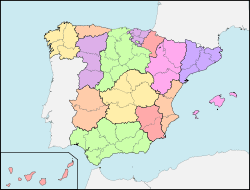León (historical region)

The region of León or Leonese region (Spanish: región de León and Asturian: rexón de Llión) is a historic territory defined by the 1833 Spanish administrative organisation. The Leonese region encompassed the provinces of Salamanca, Zamora, and León, now part of the modern Spanish autonomous community of Castile and León. As is the case with other historical regions, and continuing with centuries of history, the inhabitants of the leonese region are all called leoneses. Even today, according with official autonomous government, the historical territorial adjective is used in addition with the modern annexed territory, the rest of Old Castile, being "castilians and leoneses".
Leonese History
Until 1833, the formerly independent Kingdom of León, situated in the northwest region of the Iberian Peninsula, retained the status of a kingdom although dynastic union had brought it into the Crown of Castile. The Kingdom of León was founded in 910 A.D. when the Christian princes of Asturias along the northern coast of the peninsula shifted their main seat from Oviedo to the city of León. The Atlantic provinces became the Kingdom of Portugal in 1139, and the eastern, inland part of the kingdom was joined dynastically to the Kingdom of Castile first in 1037–1065, again 1077–1109 and 1126–1157, 1230–1296 and from 1301 onward. (See Castile and León/Historic union of the Kingdoms of Castile and León). León retained the status of a kingdom until 1833, being composed by Adelantamientos Mayores, where Leonese Adelantamiento consisted of the territories between the Picos de Europa and the Duero river.
In 1188 the Kingdom of León developed The Cortes of León, one of the earliest Parliaments in Europe, and in 1202 a legislation about economics.
Present
At present, León is composed of the provinces of León, Zamora, and Salamanca, is now part of the autonomous community of Castile and León within the modern Kingdom of Spain.
Political parties representing "Leonesismo", the Leonese regionalist and nationalist movements, support the creation of an autonomous community separate from Castile. Leonesist parties gained 13.6% of votes cast in the León autonomic elections in 2007. There have also been initiatives approved by some Leonese city councils to establish a NUTS-2 (European Statistical Region) for León.
Leonese Language
The Leonese language is recognised by the Statute of Autonomy of the present day autonomous community of Castile and León. The Provincial Government of León signed accords with language associations to promote Leonese. Leonese is taught in sixteen schools of León city and to adults in Mansilla de las Mulas, La Bañeza, Valencia de Don Juan and Ponferrada. The City Council of León promotes the language by publishing some of their announcements in Leonese.
See also
- Kingdom of León
- Leonese language
- Autonomous communities of Spain
- Nationalisms and regionalisms of Spain
- Leonese Country
- Province of Salamanca
- Province of Zamora
- Province of León